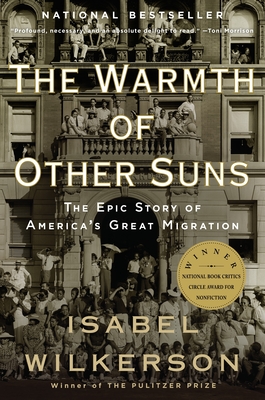Book Review: The Warmth of Other Suns: The Epic Story of America’s Great Migration
by Isabel Wilkerson
20-time National Bestseller, Adult Nonfiction (Paperback)
- A 2024 National Bestselling Book – Adult Nonfiction (Paperback)
- A 2023 National Bestselling Book - Adult Nonfiction (Paperback)
- NYT Best Book of the 21st Century
- 8 Time AALBC.com Bestselling Book!
- Selected for 2 Book Clubs’s Reading Lists
(Oct 04, 2011)
Nonfiction, Paperback, 640 pages
More Info ▶
Book Reviewed by Connie Bradley
I finally finished the 620-page The Warmth of Other Suns by Pulitzer
Prize winning author, Isabel Wilkerson, and it was a trip! Literally, - its
subtitle being "the epic story of America’s great migration." This was an
amazing, magnificent book chronicling the history of great numbers of Blacks
who began leaving the south to seek a better life in the big cities of the
North during the time period between 1915 through 1970. I was particularly
interested in checking this book out because my mother was a part of this
exodus, having left her home town of Franklin, Tennessee, in 1916 to seek
her fortune in Chicago. My father, who was a midwestern farm boy from
Kansas, had a little different history, arriving in Chicago in 1914 after
having been kidnapped by his father, who came back to Kansas to rescue him
from an abusive aunt in whose care he had been entrusted after his mother
died. But - that’s another story.
Anyway, many of the anecdotes related in this book perfectly described the
experiences I remember my parents talking about when they reminisced about
their early years in Chi-Town. This is one of the reasons I found this book
so engrossing as it followed the adventures of 3 migrants during 3 different
decades, a young woman who came to Chicago from Mississippi in the 1930s, a
youth who fled to New York from Florida in the 1940s, and a doctor who left
Louisiana for Los Angeles in the 1950s. Dispersed between their stories is a
wealth of interesting history about the life and times of black folks
struggling to improve their living conditions during the 85-year period that
encompassed the great migration.
What was most compelling and depressing about this documentary was how hated
Blacks were both by their southern oppressors and the working class
northerners who viewed them as a threat to their status. What was inspiring
was how these pioneers persevered, kept on pushing, their eyes on the
proverbial prize, as they drew from the inner strength that 400 years of
degradation couldn’t kill.
I can’t say enough about the skills and artistry of the author a young black
woman from Washington DC, whose parents were migrants from the south. As
dense as this book was, it was a "painless" read with its seamless narrative
and characters that came to life. The only problem I had was how she made no
mention of the black migrants who after coming north, left the metropolises
to settle in their suburbs. My parents moved from Chicago in 1922, becoming
members of the black colonies who occupied their own little sections of the
villages and towns that ringed the big cities, removed from the hazards of
urban life, leading less stressful existences. This once again reminded me
of how the black experience varies, and how mine is not that typical.
In any case, I actually grew sad as the book drew to a close because I was
going to have to bid farewell to the 3 main subjects, friends whom I had
come to love and admire and empathize with as I accompanied them through the
ups and downs of their quest for freedom.
Needless to say, I highly recommend "The Warmth of Other Suns". Even its
title impresses me. It says so much, and is a quote from a Richard Wright
poem. This book is well worth the time it takes to read, and I give it 4 out
of a possible 4 stars. ****


